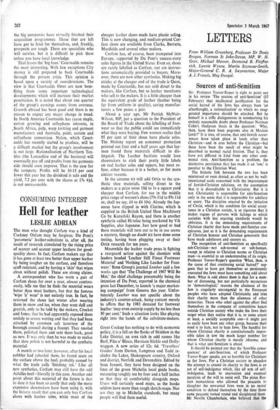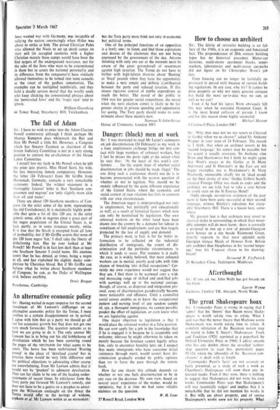Sources of anti-Semitism
LETTERS
From William Greenberg, Professor Sir Denis Brogan, Norman St John-Stevas, MP, W. H. Geer, Michael Manser, Desmond R. FitzPat- rick, Lawrie Wynne, Martin Seymour-Smith, Major-General C. R. A. Swynnerton, Major A. I. Francis, Meg Dougal.
Sir: Professor Trevor-Roper is right to point out in his review 'The sources of anti-Semitism' (17 February) that intellectual justification for the social hatred of the Jews has always been 'an afterthought, a rationalisation' to which no exag- gerated importance should be attached. But he himself is a trifle disingenuous in summarising his entirely reasonable doubt about Professor Norman Cohn's Oedipean thesis in the question: 'Why, then, have there been pogroms also in Moslem lands?' It is true, of course, that anti-Jewish occur- rences have taken place in lands other than Christian—and in eras before the Christian—but these have been the result of what might be described as normal racial friction. That is, they have not differed in kind from any other com- munal riots. Anti-Semitism as a problem, the distinctive persistence that has made it an 'ism,' is peculiar to the Christian West.
The historic link between the two has been minimised or even denied, as often as not by well- intentioned souls concerned with the improvement of Jewish-Christian relations, on the assumption that it is discreditable to Christianity. But it is not. Christianity is responsible for anti-Semitism only in the sense that it is responsible for adultery or usury. The discipline exacted by the imitation of Christ, which is the condition for social accep- tance in a Christian society, is so rigorous that it makes rogues of persons with failings to which societies with less exacting standards would be oblivious. It is the demanding requirements of Christian charity that have made anti-Semites con- spicuous, just as it is the demanding requirements of Christian honour and Christian generosity that have made adulterers and usurers so.
The recognition of anti-Semitism as specifically sub-Christian—not sub-normal or sub-human, except in relation to Christian norms or Christian man—is essential to an understanding of its origin. Professor Trevor-Roper's question 'What, then, is the cause of that continuing social hatred?' sug- gests that to have got themselves so persistently execrated the Jews must have something odd about them. What is odd about them is that for a num- ber of distressing, but not particularly mysterious or 'demonological,' reasons the alienness of the Jew is singularly uncongenial to the European peoples who have adopted Christianity and tries their charity more than the alienness of other minorities. Those who rebel against the effort find themselves in the company of compulsive haters outside Christian society who make the Jews their target when they realise that it is, to some extent at least, a socially acceptable one—it might just as easily have been any other group, because their need is to hate, not to hate Jews. The handful for whom Christian charity is constitutionally impos- sible takes in tow the much larger number for whom Christian charity is merely irksome, and that is what anti-Semitism is about It should be pointed out that the 'horrible conse- quences' of anti-Semitism, of which Professor Trevor-Roper speaks, are as horrible for Christians as for Jews. For a Christian society to abandon the attempt to extend its charity to the Jews is an act of self-indulgence which, like all acts of self- indulgence, leads to enervation and eventual paralysis of the will to resist evil. The pious Rus- sian monarchists who allowed the peasants to slaughter the unwanted Jews were in no moral condition to defend themselves by the time those same peasants turned round and slaughtered them. Mr Neville Chamberlain, who believed that the Jews wanted war with Germany, was incapable of rallying the nation convincingly when Hitler was about to strike at him. The proud Christian Poles who allowed the Nazis to set up death camps on their soil (in occupied countries with a higher Christian morale these camps would have been the first targets of the underground resistance, not for the sake of the Jews who were to be exterminated in them but to assert the national personality and its difference from the conqueror's) have similarly allowed themselves to be turned into tame eunuchs at the court of the godless communists. The examples can be multiplied indefinitely, and they hold a deadly serious moral that the woolly souls who keep clucking the conventional phrases about the `persecuted Jews' and the 'tragic race' tend to ignore.



































 Previous page
Previous page